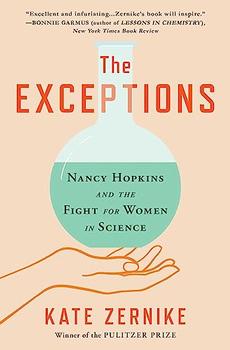Book Club Discussion Questions
In a book club? Subscribe to our Book Club Newsletter and get our best book club books of 2025!
For supplemental discussion material see our Beyond the Book article, Rosalind Franklin and the Discovery of the Structure of DNA and our BookBrowse Review of The Exceptions.
Please be aware that this discussion guide will contain spoilers!
- There are several instances where Nancy Hopkins experiences physical assault (for example, on page 21, when Francis Crick gropes her, and on page 34, when she's in the hospital). How was she able to continue working in a male-dominated workspace after these incidents?
- On page 61, Nancy recalls that her boss, Mark Ptashne, "had told her that she was smarter than any other woman at Harvard and at least half the men." Make note of the backhanded compliments that Nancy receives throughout the book. Discuss how her male colleagues and supervisors use these kinds of observations to pit the women against each other. Do you think that's intentional? Why or why not?
- Many of the women highlighted in The Exceptions who came before Nancy—Rosalind Franklin, Dr. Ruth Hubbard, and Barbara McClintock—experienced humiliating discrimination, including lack of acknowledgment for their critical scientific contributions. How did each of them handle this differently? Discuss the differences in their careers and personal lives.
- Nancy's marriage to Brooke is complicated by his appearance of being supportive and progressive, but also feeling threatened by her expertise in a field he does not understand (see page 77). Compare and contrast Brooke's attitude toward Nancy with that of Gene Dresselhaus toward Millie.
- "Mary-Lou suspected that her professors were telling her about Barbara McClintock because Barbara McClintock was the only female scientist they could think of" (page 86). How important is it to have role models you can relate to in your field? Are there career paths that you chose not to take because you didn't know anyone like you in those fields or positions?
- What similarities are there in how Mary-Lou Pardue and Nancy Hopkins approached their early careers in science?
- Throughout The Exceptions, there are people (usually men) in positions of leadership who approach their work in a more equitable fashion (Joe Gall and Jim Watson). Do you think this is learned behavior from their education and backgrounds, or does it have more to do with their character?
- On pages 146–47, Zernike outlines a promotional brochure that the MIT alumnae association sends out to 10,500 girls across the nation. What picture do the quotations on the brochure paint of MIT? How would a brochure like this be received today by high school students in your circles?
- On pages 153–54, Nancy experiences challenges as a result of the common lab space initiative at MIT. Too often, efforts toward equality in a workspace don't help the people who most need them. What are efforts in your workplace that have gone wrong in a similar way?
- In a letter addressed to a woman in MIT's administrative office, Nancy notes, "You are quite right that it is probably the tremendous stress of demanding their share that causes women to retreat too soon and thus to almost invariably end up with less" (page 245). How does this ring true for Nancy in her career at MIT? How does it continue to ring true today?
- Nancy's discovery that the male faculty members have almost double the lab space she does (page 249) compels her to finally start fighting back. Why do you think it took her so long to see the sexism in her field? How much of it is due to gaslighting from male colleagues and supervisors?
- Near the end of the book (page 350), Nancy stirs up a new round of press, asking the questions "Were women in short supply at the highest levels of science because they were not good at it and did not like it? Or because they had repeatedly been told that they were not good at it and did not like it?" What other areas of expertise could you assign that second question to today?
- If people in your book club also work in STEM careers, ask them what they've seen or experienced in the workplace. Is discrimination like what Nancy experienced prevalent in their workplace? If so, how do they think it could change?
Enhance Your Book Club
- Read about women in science for two months of book club! After you finish The Exceptions, read Lessons in Chemistry by Bonnie Garmus. Compare and contrast the life of Nancy Hopkins with Elizabeth Zott.
- Watch the short documentary The Uprising from MIT Press. After you've finished, look up the women featured in the documentary and share with the group about the important discoveries and innovations they've each made in their respective fields.
- Before you start reading The Exceptions, read the original MIT report in the faculty newsletter, "A Study on the Status of Women Faculty in Science at MIT," and discuss the data presented. Does any of it stick out to you more than the rest?
Unless otherwise stated, this discussion guide is reprinted with the permission of Scribner.
Any page references refer to a USA edition of the book, usually the trade paperback version, and may vary in other editions.
